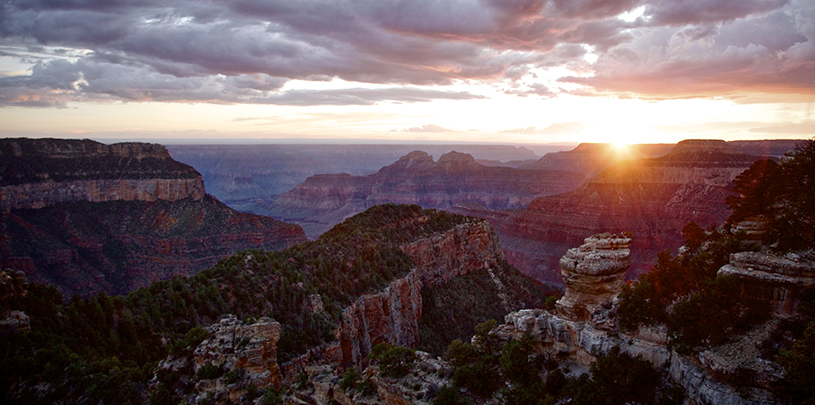
 by Amber Reimondo, Energy Director
by Amber Reimondo, Energy Director
Perhaps no place embodies the age-old adage "the whole is greater than the sum of its parts better" than the Grand Canyon. For its worth lies not in a single rock layer, but in the natural, scenic, cultural, and spiritual values embedded within the mile-deep canyon.
Local communities have long recognized that the benefits of protecting the Grand Canyon as a natural treasure far outweigh the wealth of minerals buried beneath the surface. Local governments, tribes, and businesses are speaking up in support of a bill called the Grand Canyon Centennial Protection Act, which would permanently ban mining on more than 1 million acres of public lands surrounding Grand Canyon National Park.
Long before the Grand Canyon was designated a national park, it was home to Native peoples. The Havasupai, who live deep within the folds of the Grand Canyon, have been outspoken opponents of uranium mining on their ancestral lands for decades. They are worried that a uranium mine near the south rim of the Grand Canyon will contaminate the aquifer that feeds their sole source of water for all life in Supai village.
This March, the Havasupai tribe passed a resolution in support of the Grand Canyon Centennial Protection Act, saying, “We, the Havasu ‘Baaja, will be the ones who suffer the consequences of not knowing the science and not knowing the effects of uranium mining around the Grand Canyon.”
In a recent resolution, the Hopi Tribe, which is still dealing with the legacy of uranium contamination from the last uranium boom, offers its enthusiastic support for the bill and for “laws that support life and not destruction and death.” The resolution further states, “The legacy of uranium mining has devastated the people and the land, and the 1872 mining law continues to destroy the land and lives of Hopisinom, Native Americans and Americans alike.”
 Clark Tenakhongva, Vice Chairman of the Hopi Tribe, speaks in support of the Grand Canyon Centennial Protection Act at the bill's announcement in February 2019. AMY S. MARTIN
Clark Tenakhongva, Vice Chairman of the Hopi Tribe, speaks in support of the Grand Canyon Centennial Protection Act at the bill's announcement in February 2019. AMY S. MARTIN
For similar reasons, the Inter Tribal Council of Arizona, which represents 21 Arizona tribes, has offered its support for permanently banning mining around Grand Canyon, stating, “the Colorado River and the major drainages which feed into the river are connected to ground water sources that would be affected by these mining operations.”
In order to protect lands sacred to tribes in the Southwest and protect waters that feed springs in the region, the National Congress of American Indians has also endorsed the bill.
Read: Tribal Leaders Call for Permanent Grand Canyon Mining Ban
Grand Canyon National Park is an economic engine in northern Arizona, so it’s no surprise that gateway communities like Flagstaff, Arizona are champions of the bill. In testimony before Congress in June, Flagstaff Mayor Coral Evans told a subcommittee, “Grand Canyon National Park is the lifeblood of our community and economy and protecting it now and for future generations is of paramount interest. For this reason, we strongly support H.R. 1373, the Grand Canyon Centennial Act.”
 Coral Evans, Mayor of Flagstaff (center), testifies in support of the bill at a House subcommittee meeting this June.
Coral Evans, Mayor of Flagstaff (center), testifies in support of the bill at a House subcommittee meeting this June.
The Flagstaff City Council and the Coconino County Board of Supervisors have passed resolutions in support of banning uranium mining around the Grand Canyon, acknowledging that the crown jewel national park plays an integral role to the tourism economy in Flagstaff and the county.
Steve Finch, president and CEO of the Flagstaff Lodging, Restaurant & Tourism Association, says that without the Grand Canyon, Flagstaff’s tourism would be a third to 20 percent of what it is now. In a letter to the House Committee of Natural Resources on behalf of the association, Finch writes, “There’s one thing we can be certain of: uranium mining companies cannot be permitted to further risk the health and economic sustainability of our region’s communities.”
Simply put, uranium mining on the doorstep of our country’s most treasured national park isn’t good for business. The Conservation Alliance, a coalition of hundreds of outdoor and recreation businesses from across the country, supports the Grand Canyon Centennial Protection Act because the bill “adds economic certainty for our industry, protecting the rich cultural and historical values of the area. This thoughtful legislation also ensures that the myriad of other land uses, including hunting, camping, grazing, hiking, mountain biking, and off-road vehicle use, are permitted.”
Read: Grand Canyon Tourism Fuels Arizona's Economy
Stand with local governments, business owners, Native American tribes, and Grand Canyon lovers around the world by supporting the Grand Canyon Centennial Protection Act. The bill is currently in Congress, awaiting the full House vote. Write your elected representatives today in support of permanently banning uranium mining around the Grand Canyon.
A small victory in the legal case challenging Daneros uranium mine, near Bears Ears National Monument.
Read MoreGroundwater pumping at a uranium mine near the Grand Canyon will affect the canyon's springs, scientists says.
Read MoreA rally in Salt Lake City followed by a spiritual walk in White Mesa demonstrate the Ute community's determination to see uranium mill close.
Read More